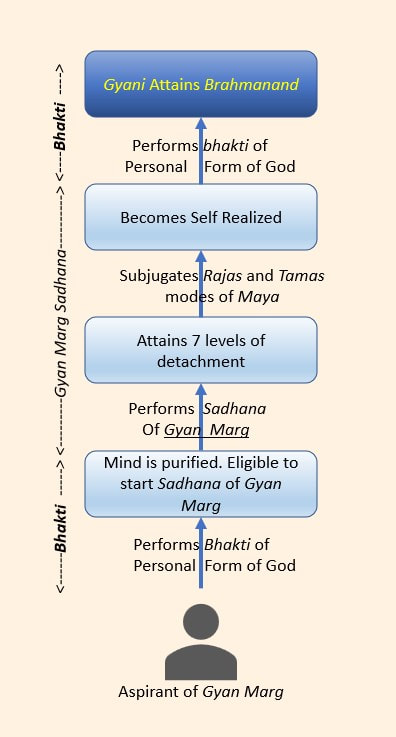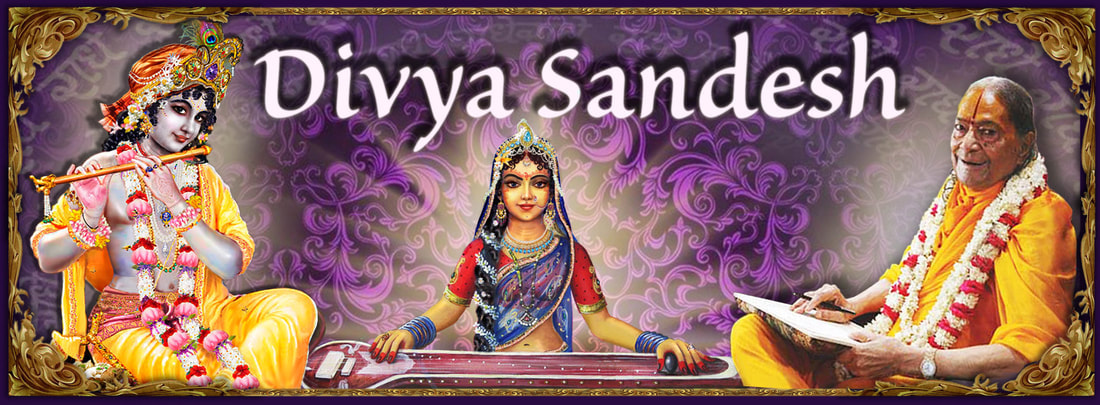An unwavering realization of reality is called gyan or true knowledge. Thus, firm knowledge of God is Gyan. Knowledge of God is comprised of the knowledge of eternal and temporary matters, which results in detachment from the entire realm of Maya i.e. from this world up to the abode of Brahma (creator).
The path of knowledge for attaining God is called gyan marg. Before learning "a b c" on the path of knowledge one has to master the following four traits called Sadhan-chatushtaya (साधन चतुष्टय).
The path of knowledge for attaining God is called gyan marg. Before learning "a b c" on the path of knowledge one has to master the following four traits called Sadhan-chatushtaya (साधन चतुष्टय).
 Seemingly impossible six states of mind are prerequisites for stepping on the path of Gyan
Seemingly impossible six states of mind are prerequisites for stepping on the path of Gyan
One who has mastered the following four states is called Sadhan-chatushtaya-sampann (साधन चतुष्टय सम्पन्न).
- nityanitya vastu vivekaḥ parigaṇyate (नित्यनित्य वस्तु विवेकः परिगण्यते) : The unwavering cognizance of permanent and temporary entities.
- ihāmutraphalabhoga parityāgaḥ (इहामुत्रफलभोग परित्यागः) : The above mentioned knowledge would lead the aspirant naturally to get thoroughly detached from the material desires. Since everything in this world and thereafter up to the abode of Brahma, is transient.
- śamadamādi ṣaṭa saṃpatti: (शमदमादि षट संपत्ति:) : accomplishment of six virtues of mind.
- Sham (शम) - absolute control on the mind and then navigating it towards God.
- Dam (दम) - control of the senses.
- Titikchha (तितिक्षा) - Having patience and forbearance due to unwavering understanding that every good or bad fortune is the outcome of one's own deeds, which one has to bear.
- Shraddha (श्रद्धा) – Unyielding faith in God.
- Samadhan (समाधान) – All doubts have been cleared and there is clarity in the concept of God realization.
- Uparati (उपरति) – Total detachment from the world and then the desire of liberation is extremely strong. This inspires an aspirant to do anything to be liberated from Maya. This is the beginning of the path of Gyan.
- mumukṣatvamitisphuṭam (मुमुक्षत्वमितिस्फुटम्) : Unflinching desire of liberation.
Once the above-mentioned mental states have been mastered then the person has to practice detachment which is called Vairagya (वैराग्य) in Sanskrit [1]. This means have neither affinity nor malice towards anything or anyone in the world.
Then he crosses other levels of Gyan namely
- Vivek (विवेक) - Ability to discriminate eternal from transient things, and thus exclusively pursue eternal things
- Vairagya (वैराग्य) - Complete detachment from the world. In this state if all of a sudden one were to loss of wife, son, wealth, business, all at the same moment, then too the aspirant's mind wont be distracted.
- Shat-sampatti (शमादि षट् सम्पत्ति) – above mentioned six properties of the mind.
- Mumukchhuttva (मुमुक्षुत्व) - intense desire for liberation.
- Shravan (श्रवण) – Listening to the philosophy to attain liberation.
- Manan (मनन) – to contemplate deeply on the philosophy.
- Nididhyaasan (निदिध्यासन) – to follow the teachings sincerely.
- Samadhi (समाधि) – to go deep in transcendental meditation.
In fact all these levels are the progression of detachment. Eventually the aspirant conquers one aspect of Maya. There are two aspects are
Swaroopavarika Maya is that part of ignorance which hides our own self from us. We are souls, immortal and divine, yet, we do not know this reality just because of swaroopavarika Maya. The gyani crosses this part of Maya and becomes free from the two modes of Maya. Yet, the third mode sattva guna still remains and the jeev attains the knowledge of self (atma or soul).
The Gita says,
- Swaroopavarika Maya: The 2 modes of Maya
- rajas guna or the material mode of passion and
- tamas guna or the material mode of demonic tendencies
- Gunavarika Maya: sattva guna which is the material mode of righteousness
Swaroopavarika Maya is that part of ignorance which hides our own self from us. We are souls, immortal and divine, yet, we do not know this reality just because of swaroopavarika Maya. The gyani crosses this part of Maya and becomes free from the two modes of Maya. Yet, the third mode sattva guna still remains and the jeev attains the knowledge of self (atma or soul).
The Gita says,
सत्त्वाद् संजायते ज्ञानम्
Sattvād san̄jāyatē jñānam
Sattvād san̄jāyatē jñānam
"The knowledge of atma generates from the sattva guna".
The knowledge of atma is so blissful that the aspirant mistakenly feels that he has actually attained the bliss of God realization. This state of a gyani is called brahmbhoot avastha (ब्रह्मभूतावस्था), the level where he knows or feels nothing except the bliss of knowledge of soul. The Gita says for such a gyani:
The knowledge of atma is so blissful that the aspirant mistakenly feels that he has actually attained the bliss of God realization. This state of a gyani is called brahmbhoot avastha (ब्रह्मभूतावस्था), the level where he knows or feels nothing except the bliss of knowledge of soul. The Gita says for such a gyani:
ब्रह्मभूतः प्रसन्नात्मा न शोचति न कांक्षति। समः सर्वेषुभूतेषु मद्भक्तिं लभते पराम् ॥ गीता १८.५४
Brahmabhūtaḥ prasannātmā na śōcati na kāṅkṣati. Samaḥ sarvēṣubhūtēṣu madbhaktiṁ labhatē parām. Gītā 18.54
Brahmabhūtaḥ prasannātmā na śōcati na kāṅkṣati. Samaḥ sarvēṣubhūtēṣu madbhaktiṁ labhatē parām. Gītā 18.54
"A gyani at this stage is ever cheerful. Neither he feels sad nor does he desire anything". He feels Atma in everyone and everywhere. Hence he becomes totally impartial.
But he hasn't attained the Nirakaar Brahm [1], so spiritual downfall from this state is still a possibility. So, what does a gyani who has reached the state of self-realization do next?
But he hasn't attained the Nirakaar Brahm [1], so spiritual downfall from this state is still a possibility. So, what does a gyani who has reached the state of self-realization do next?
God cannot be realized by any means other than bhakti [2]. Therefore, devotion is inevitable for emancipation from Maya. As Jagadguru Shankaracharya says -
|
मोक्षकारणसामग्र्यां भक्तिरेव गरियसी॥ शंकराचार्य
Mōkṣakāraṇasāmagryāṁ bhaktirēva gariyasī. Śaṅkarācārya Jagadguru Shankaracharya asserts that even Sham (शम) or purification of mind is not possible without Shri Krishna Bhakti, then it is obvious that liberation is unattainable;
शुद्धयति हि नान्तरात्मा कृष्णपदाम्भोजभक्तिमृते ॥ शंकराचार्य
Śud'dhayati hi nāntarātmā Kr̥ṣṇapadāmbhōjabhaktimr̥tē. Śaṅkarācārya But, there are two kinds of devotion, since there are two forms of the same Almighty Supreme God. The Vedas say;
|
द्वेवाव ब्रह्मणो रूपे, मूर्तं चैवामूर्तं च।
Dvēvāva brahmaṇō rūpē, mūrtaṁ caivāmūrtaṁ ca.
Dvēvāva brahmaṇō rūpē, mūrtaṁ caivāmūrtaṁ ca.
There are two forms of God; one with a personal form (saakaar brahm), and other form is impersonal or abstract (Niraakaar brahma). Jagadguru Shankaracharya also asserts the same in the following words;
मूर्तं चैवामूर्तं द्वे एव ब्रह्मणो रूपे। इत्युपनिष्त्तयोर्वा द्वौभक्तौभगवदुपदिष्टौ॥
Mūrtaṁ caivāmūrtaṁ dvē ēva brahmaṇō rūpē.
Ityupaniṣttayōrvā dvaubhaktaubhagavadupadiṣṭau.
Mūrtaṁ caivāmūrtaṁ dvē ēva brahmaṇō rūpē.
Ityupaniṣttayōrvā dvaubhaktaubhagavadupadiṣṭau.
A Gyani worships formless God. They meditate upon a dot of light as the symbol of God whereas a devotee chooses ones of the forms as God as one's diety, endows that divine form of God with all divine qualities and then meditates upon that divine form. Thus, both are devoted to God. Gyanis worship formless God and devotees worship God with a particular form of their choice.
So when both worship God then which path is easier to follow?
So when both worship God then which path is easier to follow?
The path of knowledge is more difficult as compared to the path of devotion. An aspirant of Gyan Marg cannot lean-in on any name, form, pastimes and attributes of God, so focussing the fickle mind on nothing is extremely difficult.
|
क्षुरस्य धारा निशिता दुरत्यया॥ कठोपनिषत्
Kṣurasya dhārā niśitā duratyayā. Kaṭhōpaniṣat "Gyan Marg is like walking on the edge of the sword".
ग्यान अगम प्रत्युह अनेका। साधन कठिन न मन महुँ टेका॥
ज्ञान कै पंथ कृपाण कै धारा। परेत खगेस होहिं नहिं बारा॥ राम चरित मानस Gyāna agama pratyuha anēkā. Sādhana kaṭhina na mana mahum̐ ṭēkā. Jñāna kai pantha kr̥pāṇa kai dhārā. Parēta khagēsa hōhiṁ nahiṁ bārā. Rāma carita mānasa "Gyan Marg is very difficult to walk on. Sadhana of Gyan marg is also very difficult".
|
But if someone were to meet the pre-qualification of walking on the gyan marg and bravely faces all the hardships, still there are many more challenges to combat on the path of Gyan such as,
1. As Lord Krishna says in the Gita;
1. As Lord Krishna says in the Gita;
क्लेषोऽधिकतरस्तेषा मव्यक्तासक्तचेतसाम् । अव्यक्ता हि गतिर्दुःखं देहवद्भिरवऔयते॥ गीता १२.५
Klēṣō̕dhikatarastēṣā mavyaktāsaktacētasām. Avyaktā hi gatirduḥkhaṁ dēhavadbhirava'auyatē. Gītā 12.5
Klēṣō̕dhikatarastēṣā mavyaktāsaktacētasām. Avyaktā hi gatirduḥkhaṁ dēhavadbhirava'auyatē. Gītā 12.5
"Human beings have a tangible body so it is very difficult for them to focus on intangible, unmanifested personality of Niraakaar brahma".
2. Eligibility to take the first step on this path is very challenging. As I have explained earlier in this article, one has to master four qualities prior to stepping on this path, which is called sadhan chatushtaya.
निर्विणणानां ज्ञानयोगः॥
Nirviṇaṇānāṁ jñānayōgaḥ.
Nirviṇaṇānāṁ jñānayōgaḥ.
"One cannot tread on the path of knowledge without being totally detached from material attactions."
विवेकिनो विरक्तस्य शमादिगुणशालिनः। मुमुक्षोरेव हि ब्रह्मजिज्ञासा योग्यता मता॥ शंकरा.
Vivēkinō viraktasya śamādiguṇaśālinaḥ. Mumukṣōrēva hi brahmajijñāsā yōgyatā matā. Śaṅkarā.
Vivēkinō viraktasya śamādiguṇaśālinaḥ. Mumukṣōrēva hi brahmajijñāsā yōgyatā matā. Śaṅkarā.
"At first, total detachment is extremely difficult. Then the other conditions are even more complicated".
In comparing this to the path of bhakti... Those who are neither completely detached nor attached to the world are eligible to follow the path of devotion.
In comparing this to the path of bhakti... Those who are neither completely detached nor attached to the world are eligible to follow the path of devotion.
नातिसक्तो न वैराग्यभागस्यामधिकार्यसौ॥ भ. र.सिं.
Nātisaktō na vairāgyabhāgasyāmadhikāryasau. Bha. Ra.Siṁ.
सर्वेधिकारिणो ह्यत्र हरिभक्तौ यथ नृप॥ पदम पुराण
Sarvēdhikāriṇō hyatra haribhaktau yatha nr̥pa. Padama purāṇa
शास्त्रतः श्रूयते भक्तौ नृमात्रस्याधिकारिता ॥ भ. र.सिं.
Śāstrataḥ Śrūyatē bhaktau nr̥mātrasyādhikāritā Bha. Ra.Siṁ.
भगवत्प्राप्त्युपायो हि सर्वसाधन हीनता॥ रामानंद
Bhagavatprāptyupāyō hi sarvasādhana hīnatā. Rāmānanda
कहहु भगति पथ कवन प्रयासा। जोग न जप तप मख उपवासा॥ रा.च.मानस
kahahu bhagati patha kavana prayāsā. Jōga na japa tapa makha upavāsā. Rā.Ca.Mānasa
Nātisaktō na vairāgyabhāgasyāmadhikāryasau. Bha. Ra.Siṁ.
सर्वेधिकारिणो ह्यत्र हरिभक्तौ यथ नृप॥ पदम पुराण
Sarvēdhikāriṇō hyatra haribhaktau yatha nr̥pa. Padama purāṇa
शास्त्रतः श्रूयते भक्तौ नृमात्रस्याधिकारिता ॥ भ. र.सिं.
Śāstrataḥ Śrūyatē bhaktau nr̥mātrasyādhikāritā Bha. Ra.Siṁ.
भगवत्प्राप्त्युपायो हि सर्वसाधन हीनता॥ रामानंद
Bhagavatprāptyupāyō hi sarvasādhana hīnatā. Rāmānanda
कहहु भगति पथ कवन प्रयासा। जोग न जप तप मख उपवासा॥ रा.च.मानस
kahahu bhagati patha kavana prayāsā. Jōga na japa tapa makha upavāsā. Rā.Ca.Mānasa
According to Tulsi das "What is the problem in walking on the path of Bhakti. One does not practise yoga to control the mind, perform penance, perform elaborate Vedic injunctions".
3. If someone successfully meets the prerequisites to follow the path of knowledge, there is always a possibility of downfall at every step because the gyani relies on his own knowledge and detachment [3], and does not take the support of God.
On the contrary, a devotee walks on the path depending completely on the grace of God and with total reliance on God. The Bhagavat says the same in the following verse:
On the contrary, a devotee walks on the path depending completely on the grace of God and with total reliance on God. The Bhagavat says the same in the following verse:
येऽन्येरविन्दाक्ष विमुक्तमानिनस्त्वय्यस्तभावादविशुद्ध बुद्धयः ।
Yē̕n'yēravindākṣa Vimuktamāninastvayyastabhāvādaviśud'dha bud'dhayaḥ.
Yē̕n'yēravindākṣa Vimuktamāninastvayyastabhāvādaviśud'dha bud'dhayaḥ.
"Upon self-realization, the gyani might consider himself to be free, but he is still not past the realm of Maya. He can again fall from there into pit of Maya".
आरुह्यकृच्छ्रेण परं पदं ततः पतन्त्यधो नादृतयुष्मदंघ्र्यः॥ भाग. १०.२.३३
Āruhyakr̥cchrēṇa paraṁ padaṁ tataḥ patantyadhō nādr̥tayuṣmadaṅghryaḥ. Bhāga. 10.2.33
Āruhyakr̥cchrēṇa paraṁ padaṁ tataḥ patantyadhō nādr̥tayuṣmadaṅghryaḥ. Bhāga. 10.2.33
"Even after attaining the higher levels of gyan the gyani can experience utter downfall". But the devotees, depending thoroughly on God, never fall. Instead due to being protected by You, they roam freely without any cares
तथा न ते माधव तावकाः क्वचिद् भ्रश्यंति मार्गात् त्वयि बद्धसौहृदाः।
Tathā na tē mādhava tāvakāḥ kvacid bhraśyanti mārgāt tvayi bad'dhasauHr̥dāḥ.
त्वयभिगुप्ता विचरन्ति निर्भया विनायकानी कपमूर्धसु प्रभो॥ भाग. १०.२.३३
Tvayabhiguptā vicaranti nirbhayā vināyakānī kapamūrdhasu prabhō. Bhāga. 10.2.33
Tathā na tē mādhava tāvakāḥ kvacid bhraśyanti mārgāt tvayi bad'dhasauHr̥dāḥ.
त्वयभिगुप्ता विचरन्ति निर्भया विनायकानी कपमूर्धसु प्रभो॥ भाग. १०.२.३३
Tvayabhiguptā vicaranti nirbhayā vināyakānī kapamūrdhasu prabhō. Bhāga. 10.2.33
Some people like the challenge and whereas others take the easy road... Gyani too reaches his destination, after overcoming numerous hurdles.
So, after reaching the destination, is there any difference between gyani and bhakt?
So, after reaching the destination, is there any difference between gyani and bhakt?
Gyani's destination is not different than that of a devotee. Both of them attain the same God, as God is one.
Hence, Lord Krishna said in the Gita
Hence, Lord Krishna said in the Gita
ते प्राप्नुवन्ति मामेव सर्वभूतहिते रता: || गीता 12.4
te prāpnuvanti māmeva sarvabhūtahite ratā: || Gītā 12.4
te prāpnuvanti māmeva sarvabhūtahite ratā: || Gītā 12.4
"...by restraining their senses and being even-minded everywhere, such persons, engaged in the welfare of all beings, also attain Me.."
The greatest difference actually begins after attaining the goal.
A gyani does not believe in any form of God and wishes to have mukti from material agonies only. So upon perfection gyani gets
Thus, gyani becomes one with God, THE who is the ocean of bliss. Now the triputi (trio)ends, then how can gyani ever enjoy that bliss? If you yourself become a sweet, then how would you enjoy the taste of that sweet?
The sweetness of the bliss of the Sakar Brahm (personal form) [5] of God is ineffable and ever increasing. Many great God-realized Gyanis lived on the earth as paramhansa. This is the state in which one is always being engrossed in transcendental meditation and has no inkling of this world. They happened to experience bliss of the personal form of Brahma - Supreme Lord with merely one faculty (sight, hearing, taste, touch, smell). That single exposure to the sweetness of the personal form of Brahma with one sense forced them out of their meditative state, and naturally immersed them in divine sweetness of love bliss. For example,
All these greatest of the gyanis were exposed to the subject of only one Gyanendriyan, and experienced such an extraordinary divine bliss that they forgot about their transcendental meditation. Such is the bliss of the personal form of God [4][6].
A gyani, who worships the abstract form of God and attains mukti and after leaving the gross material body the jeev merges in the Nirakar Brahm (Formless Brahma) without body, mind or senses. Thereby, one loses the opportunity to attain the bliss of love because Formless Brahma has no form, name or pastimes [6] .
The greatest difference actually begins after attaining the goal.
A gyani does not believe in any form of God and wishes to have mukti from material agonies only. So upon perfection gyani gets
- freedom from Maya and cycle of birth and death forever.
- the divine soul, without senses, mind or intellect, merges into Supreme Being forever after leaving the sthool sharir.
Thus, gyani becomes one with God, THE who is the ocean of bliss. Now the triputi (trio)ends, then how can gyani ever enjoy that bliss? If you yourself become a sweet, then how would you enjoy the taste of that sweet?
The sweetness of the bliss of the Sakar Brahm (personal form) [5] of God is ineffable and ever increasing. Many great God-realized Gyanis lived on the earth as paramhansa. This is the state in which one is always being engrossed in transcendental meditation and has no inkling of this world. They happened to experience bliss of the personal form of Brahma - Supreme Lord with merely one faculty (sight, hearing, taste, touch, smell). That single exposure to the sweetness of the personal form of Brahma with one sense forced them out of their meditative state, and naturally immersed them in divine sweetness of love bliss. For example,
- the 4 Kumars who are the greatest gyani of Satyuga once experienced an unknown fragrance through the air. The moment they smelt the fragrance and they forgot about their transcendental meditation. Not only that they became restless to know where it came from. Through their Samadhi, they came to know that the Divine fragrance is from a Tulasi leaf which is placed on the lotus feet of MahaVishnu. Because of the touch of His feet, the scent had become divine and extremely blissful. They thought, 'If the bliss of Tulasi-leaf, which has touched His feet is so idyllic, then what can be said about His lotus feet!’ They immediately left to see Him, thus leaving behind the charm of meditating on formless God [4] which was this highest bliss as far as they knew, and asked for a boon to let him dwell at His lotus feet forever. (Bhagavat 3.15.43 & 3.15.49).
- Similarly, in Treta Yuga, King Janak saw Shri Ram just once and lost consciousness of everything around him, including the awareness of the grandiose wedding ceremony of his daughter, Mother Sita.
- In the age of Dwapar Yuga, Shukdev Ji, the orator of Shrimad Bhagavat, had heard merely one attribute of the personal form of God, Shri Krishna, and lost all interest in meditating on formless Brahma.
All these greatest of the gyanis were exposed to the subject of only one Gyanendriyan, and experienced such an extraordinary divine bliss that they forgot about their transcendental meditation. Such is the bliss of the personal form of God [4][6].
A gyani, who worships the abstract form of God and attains mukti and after leaving the gross material body the jeev merges in the Nirakar Brahm (Formless Brahma) without body, mind or senses. Thereby, one loses the opportunity to attain the bliss of love because Formless Brahma has no form, name or pastimes [6] .







